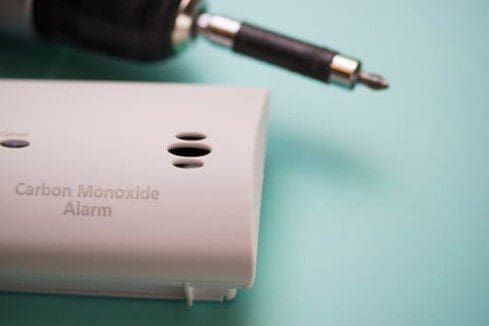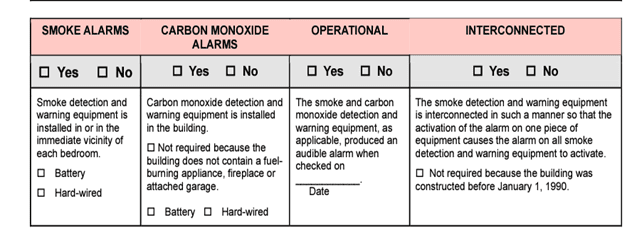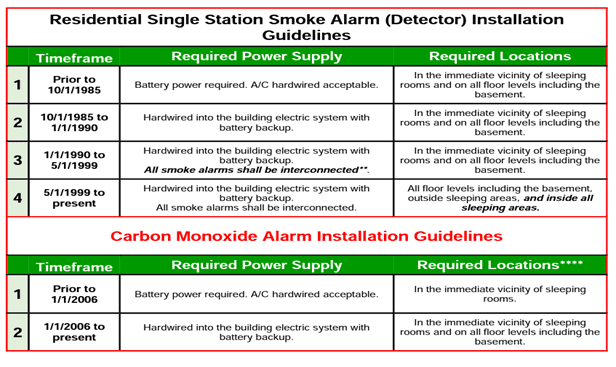 A Guide for Realtors and Sellers
A Guide for Realtors and Sellers
Last year we wrote an article about changes to the Smoke and Carbon Monoxide affidavit that State law requires sellers of residential real property to provide to their buyers at closing.
For Connecticut residential real estate closings occurring after October 1, 2023, there is yet another significant change to the seemingly ever-changing rules regarding smoke and co detectors.
The Biggest Change to the CO Detector Laws During Closing
There is no longer an option to choose to provide financial credit in lieu of completing the affidavit. Until now, many sellers (on the advice of their closing attorneys) would choose to pay a mandatory $250 credit rather than affirm in writing that the smoke and co detectors in the home were properly installed and working.
This was not necessarily because the seller did not have or believe in the value of having these important safety measures, but more because the affidavits placed an unknown liability on the sellers that attorneys advised was riskier than paying $250.
Now that the option to provide this credit has been eliminated from the law, sellers of residential real estate (with some exceptions) will be obligated to complete and sign an affidavit regarding the state of the dwelling’s smoke and carbon monoxide detectors in the affidavit. If you are a homeowner who may sell your home in the future, you’ll want to pay attention to this new law.
Key Changes In Carbon Monoxide Detector Laws
- The new form, prepared by the State Fire Marshall, has four sections: Smoke Detectors, Carbon Monoxide Detectors, Operational, and Interconnected.

- Date of Construction is Important. The chart below, which is part of the new form, shows how important the date of construction of the dwelling is in determining the requirements for the location and type of devices the home has.For all dwellings built after October 1, 1985, the smoke detectors must be hardwired with battery backup. Prior to October 1, 1985, the smoke detectors could be battery-powered. For all dwellings constructed prior to May 1, 1999, the smoke detectors must be in the immediate vicinity of sleeping rooms and on all floor levels. For dwellings constructed after 1999, the smoke detectors must be inside each sleeping area.
Carbon Monoxide detectors are required in homes that include a fuel-burning appliance, fireplace, or attached garage, which is the same requirement under current law. As of October 1, 2023, any dwelling constructed after 2006 must have the carbon monoxide detector hard-wired.
Related Post: The Truth About The Closing Date
Further, the new law requires that any dwelling constructed after 1990 have the smoke detectors interconnected so that if one warning alarm goes off, the others are alerted as well.

- Seller Must Perform Test. While the old law required the seller to affirm that the detectors were in good working order to the best of their knowledge, the new form requires the seller to insert the date on which they tested the detectors and heard an audible alarm.
These changes to Connecticut’s smoke and carbon monoxide detector laws have significant implications for real estate transactions:
- Compliance: Ensure that you are aware of the new requirements and that properties you own are compliant with the updated regulations. Non-compliance could lead to complications and delays for closings, as well as potential liabilities. The new law continues to exempt certain sellers, including executors of estates and trustees of trusts, so some sellers may not be required to produce the affidavit.
- Safety and Value: Emphasize the safety benefits of compliant smoke and carbon monoxide detectors to potential buyers. These enhanced safety features can add value to a property and provide peace of mind to homeowners.
- Upgrades and Inspections: Be prepared to perform necessary upgrades and inspections if a property does not meet the new safety standards. This may impact negotiation terms and closing timelines.
Related Post: The 12 Real Estate Closing Steps
Connecticut’s updated smoke and carbon monoxide detector laws reflect the state’s commitment to improving safety in residential properties. The new laws require sellers to be diligent and proactive since they cannot simply agree to give a credit at the closing table. By staying informed about these changes, homeowners can ensure that their homes are safer and that their real estate transactions close in a timely manner.
Disclaimer: The information provided in this article does not, and is not intended to, constitute legal advice and is for general informational purposes only.
Let Us Know How We Can Help!
Please fill in your contact information and a brief message about what you need help with. A consultation will need to be scheduled in order to provide legal guidance.
Joan Reed Wilson Esq. – Managing Partner
Practices in the areas of estate planning, elder law, Medicaid planning, conservatorships, probate and trust administration, and real estate. Admitted to practice in the States of Connecticut and California, she is the former President of the CT Chapter of the National Academy of Elder Law Attorneys (NAELA), an active member of the Elder Law Section of the Connecticut Bar Association, accredited with the PLAN of CT for Pooled Trusts, with the Veteran’s Administration to assist clients with obtaining Aid & Attendance benefits for long-term care needs and with the Agency on Aging’s CareLink Network.







